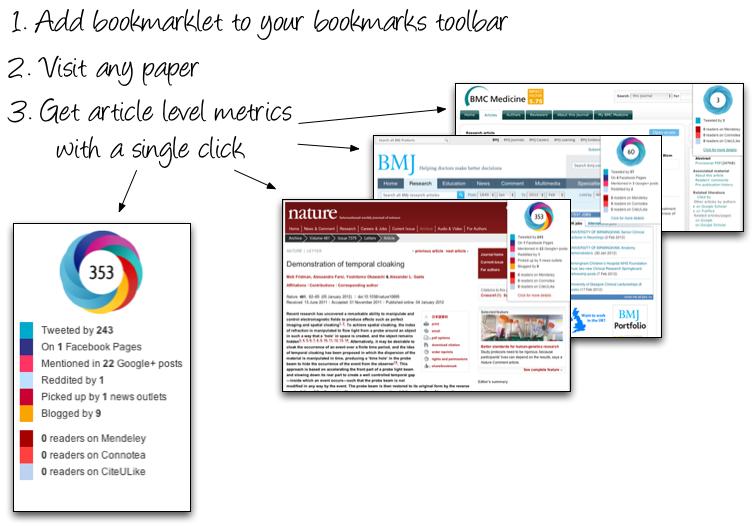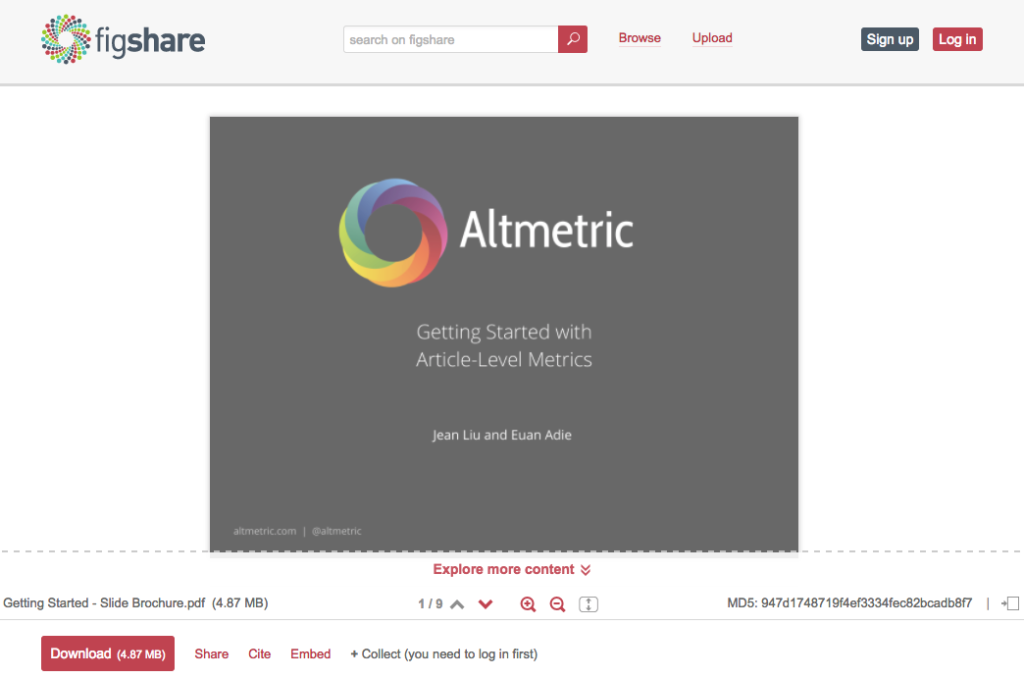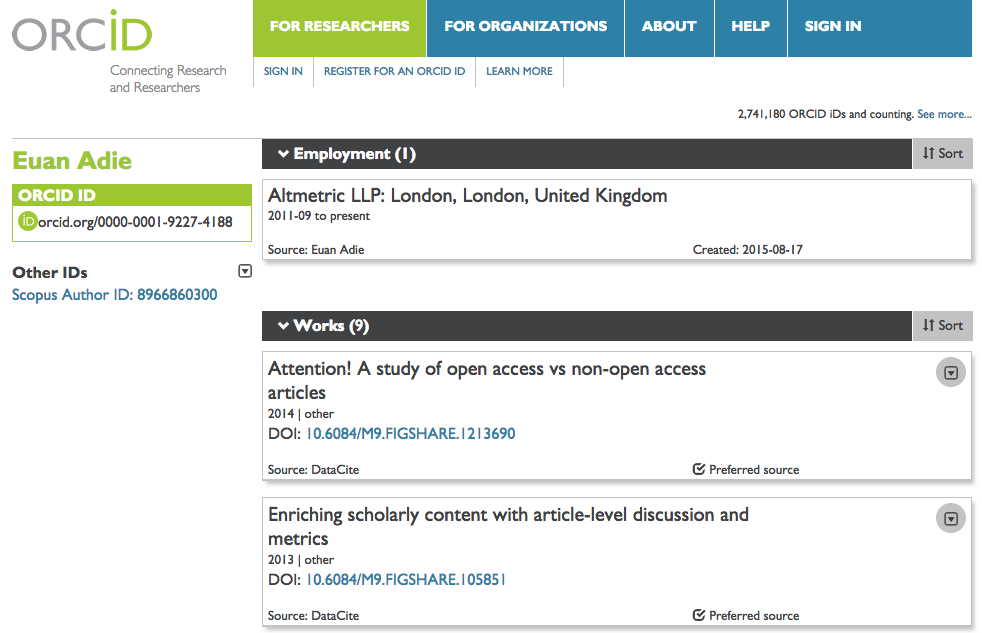Source: https://blogs.biomedcentral.com/bmcblog/2017/10/18/10-tips-for-promoting-your-research-online/
Promoting your research online is vital if you need to
provide evidence of the reach and potential broader influence of your
work, particularly when applying for promotion or tenure and funding.
Here are some top tips to help you get started:
1. Put together a strategy
Begin by thinking about which researchers and other audiences will be interested in your research, the disciplines they work in, and where they can be found. Are they within your institution, or somewhere further afield?
Next, think about the channels that would be most suitable for to promoting your work to your intended audience. It can be a good idea to start by looking at the channels that other researchers publishing in your field have used to get their work noticed. One way to do this is to use the Altmetric Bookmarklet.
 2. Write a summary
2. Write a summary
You might want to consider writing a plain English summary of your work, focused on making it more accessible to a wider audience. This will provide a good lead into your research and encourage more people to read your article.
You could then post the summary to online discussion groups and forums that you think might find it relevant. Or, if you’d rather go that extra mile, why not put together a short video summarising your work and sharing it via websites such as Wesharescience.com.
3. Make your data available
Publishing an article doesn’t tell the full story of your research. You can make images, files and other outputs associated with it available through a digital repository such as Figshare. When you upload your research to a repository they will give it a unique identifier. This makes citing your research easier, as well as tracking online attention with services such as Altmetric.
 4. Post on social media
4. Post on social media
Post links to your work via any social media accounts you have. You could also focus your promotion around any significant events that are happening, such as conferences that may be interested in your research topic, by using the event’s hashtag.
As well as using your own social profiles you may find you get more engagement from using your department’s accounts.
5. Start a blog
Think about starting your own blog and posting about your work. It doesn’t need to be a huge task and creating a simple schedule can help you post regularly.
You could also look into contacting some established bloggers that are writing about your subject area (easily identifiable via the Altmetric details pages for other publications in your field), or anyone who has a big following on Twitter that may be interested in sharing your work.
6. Link out from your email signature and profiles
It might seem obvious, but adding a link to your work to your email signature is a must! By doing this you are ensuring that your contacts are kept up to date with your latest research.
7. Use your Research Office
If you feel your work could benefit from an extra promotional push why not get in touch with your Research Office, as they may be able to help make your work more visible.
They might have access to channels such as email lists or have contacts that could be used to get your research noticed by news outlets or government agencies. Having your research mentioned on higher profile websites will increase your readership and look great on future applications. Also consider providing your research office with some key points of why your work matters and what the key outcomes were, as this can help them build a pitch for a broader audience.
8. Register for an ORCID ID
Register for an ORCID ID so that you have a unique identifier which will tie you to your work and distinguish you from other researchers. It’s easy, free and will come in useful for any manuscript or grant submissions.
 9. Make your research open
9. Make your research open
Having your work freely available to read may mean that your research reaches a wider audience and see a higher level of citations. If you would like to publish your research in this way visit your Research Office who will be able to advise on the best course of action.
10. Unique Identifiers
Make sure that whenever you mention your research online you use or link to a page that includes your work’s unique identifier, this can be a DOI, arXiv ID or PubMed ID. This is vital to ensure that your work is tracked by us at Altmetric so that you can keep on top of the conversations surrounding your research. It will also mean that your work becomes easily discoverable and so is more likely to be read and cited by other academics.
Track the results of your efforts!
Find out the impact of your promotional efforts by using stats provided on publisher websites, such as Altmetric badges, and by using tools like the Altmetric Bookmarklet.
If you’d like to read the original version of this post why not visit the Altmetric blog here.
10 tips for promoting your research online
How do you make sure the
right people are seeing your research? Is it being read as much as you’d
like? In this guest blog, Joshua Clark, Marketing Executive at
Altmetric shares some useful tips.
1. Put together a strategy
Begin by thinking about which researchers and other audiences will be interested in your research, the disciplines they work in, and where they can be found. Are they within your institution, or somewhere further afield?
Next, think about the channels that would be most suitable for to promoting your work to your intended audience. It can be a good idea to start by looking at the channels that other researchers publishing in your field have used to get their work noticed. One way to do this is to use the Altmetric Bookmarklet.
 2. Write a summary
2. Write a summaryYou might want to consider writing a plain English summary of your work, focused on making it more accessible to a wider audience. This will provide a good lead into your research and encourage more people to read your article.
You could then post the summary to online discussion groups and forums that you think might find it relevant. Or, if you’d rather go that extra mile, why not put together a short video summarising your work and sharing it via websites such as Wesharescience.com.
3. Make your data available
Publishing an article doesn’t tell the full story of your research. You can make images, files and other outputs associated with it available through a digital repository such as Figshare. When you upload your research to a repository they will give it a unique identifier. This makes citing your research easier, as well as tracking online attention with services such as Altmetric.
 4. Post on social media
4. Post on social mediaPost links to your work via any social media accounts you have. You could also focus your promotion around any significant events that are happening, such as conferences that may be interested in your research topic, by using the event’s hashtag.
As well as using your own social profiles you may find you get more engagement from using your department’s accounts.
5. Start a blog
Think about starting your own blog and posting about your work. It doesn’t need to be a huge task and creating a simple schedule can help you post regularly.
You could also look into contacting some established bloggers that are writing about your subject area (easily identifiable via the Altmetric details pages for other publications in your field), or anyone who has a big following on Twitter that may be interested in sharing your work.
6. Link out from your email signature and profiles
It might seem obvious, but adding a link to your work to your email signature is a must! By doing this you are ensuring that your contacts are kept up to date with your latest research.
7. Use your Research Office
If you feel your work could benefit from an extra promotional push why not get in touch with your Research Office, as they may be able to help make your work more visible.
They might have access to channels such as email lists or have contacts that could be used to get your research noticed by news outlets or government agencies. Having your research mentioned on higher profile websites will increase your readership and look great on future applications. Also consider providing your research office with some key points of why your work matters and what the key outcomes were, as this can help them build a pitch for a broader audience.
8. Register for an ORCID ID
Register for an ORCID ID so that you have a unique identifier which will tie you to your work and distinguish you from other researchers. It’s easy, free and will come in useful for any manuscript or grant submissions.
 9. Make your research open
9. Make your research openHaving your work freely available to read may mean that your research reaches a wider audience and see a higher level of citations. If you would like to publish your research in this way visit your Research Office who will be able to advise on the best course of action.
10. Unique Identifiers
Make sure that whenever you mention your research online you use or link to a page that includes your work’s unique identifier, this can be a DOI, arXiv ID or PubMed ID. This is vital to ensure that your work is tracked by us at Altmetric so that you can keep on top of the conversations surrounding your research. It will also mean that your work becomes easily discoverable and so is more likely to be read and cited by other academics.
Track the results of your efforts!
Find out the impact of your promotional efforts by using stats provided on publisher websites, such as Altmetric badges, and by using tools like the Altmetric Bookmarklet.
If you’d like to read the original version of this post why not visit the Altmetric blog here.
Comments